Bobby Rush
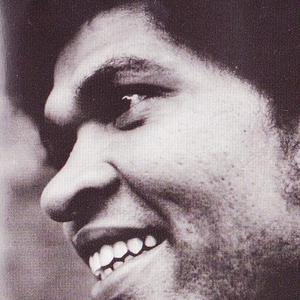
- Meta styles:
- Contemporary R&B, Electric Blues, Modern Electric Blues, Soul
At a time when most of his contemporaries are resting on their laurels, Bobby Rush-a 50-year veteran of the stage-continues to be one of the most exciting and creative artists in the R&B/blues arena. Rush's live shows are without parallel, replete with costume changes and comedic sketches acted out with the assistance of his lovely female dancers. In addressing a broad range of matters of the heart, Rush adopts various onstage persona-the adoring lover, the cuckold, the boastful stud-delivering all with a knowing wink that assures the audience that he's in on the joke.
In the context of today's all too predictable and sanitized blues market, it's easy to understand why audiences new to Rush's performances often find them novel or even bewildering. Unique they are, but Rush's signifying, jesting, and double entendr? jiving are at the heart of the blues, as exemplified by forbears such as Charley Patton, Memphis Minnie, Louis Jordan, and Howlin' Wolf.
Bobby Rush-it's pronounced as one three-syllable name-calls his music "folk funk," an apt description for a blend that's both decidedly modern and deeply rooted in tradition. Over the decades he has consistently updated his show by incorporating new styles-jump blues, Chicago style deep blues, soul, funk, and even hip-hop-into a fresh mix. At the same time, his original compositions often stem from his dipping into the well of folk wisdom, as exemplified by songs like "What's Good For the Goose is Good for the Gander Too."
The son of a preacher man, Bobby Rush was born Emmet Ellis, Jr., in the north Louisiana town of Homer; he later adopted his stage name out of respect for his father. He built his first instrument, a primitive guitar or "diddley bow," and in his early teens he was donning a fake mustache and appearing at local juke joints as a solo artist. In the mid-'50s he moved up to Chicago, where his bands included Freddie King, Earl Hooker, and Luther Allison, while on jaunts back to his family home in Pine Bluff, Arkansas, he performed with Elmore James and James' cousin Boyd Gilmore.
Rush began working as a bandleader already as a teenager after realizing that he could control his own destiny if he owned all the equipment. His entrepreneurial flair is legendary among fellow musicians, who fondly recall his working in disguise as the emcee on his own gigs, earning double pay from an unknowing club owner, and his shuffling between three gigs a night with separate bands at West Side nightclubs.
Rush's popularity as a live performer in Chicago set back the development of his recording career, but he began to achieve national acclaim in 1971 following the success of his hit "Chicken Heads" on Galaxy records. Over the next decade he recorded for labels including Jewel, Philadelphia International, Warner Brothers, and toured widely on the "chitlin circuit," the decades old network of clubs that stretches in a rough triangle between east Texas, north Florida, and Chicago.
In the early '80s Rush moved from Chicago to his current home of Jackson, Mississippi, where he recorded a series of albums for the LeJam, Ichiban, and Malaco labels, and gained the title of "king of the chitlin circuit" in the wake of hits including "Sue," "Wearin' It Out," "Ain't Studdin' You," and "Hoochie Man."
In 2003 Rush fulfilled his longtime dream of forming his own label, Deep Rush, recording the CD "Undercover Lover" and capturing the magic of his live show on DVD at the club Ground Zero in Clarksdale, Mississippi. Rush's showmanship is also prominently featured in Richard Pearce's documentary film "The Road To Memphis," broadcast on PBS in September 2003 as part of Martin Scorsese's film series "The Blues."
In the last decade Rush has gained new audiences through performances at the Kennedy Center, Carnegie Hall, and on festival stages in Europe and Japan. But catch him on an average weekend and he's just as likely to be playing to packed houses in chitlin circuit clubs in places like Nesbit, Mississippi, Macon, Georgia, and Smackover, Arkansas, before mostly black, working class audiences that conventional blues wisdom suggests no longer exist.
Success in the American music marketplace generally entails leaving behind the people that sustained you during your early years, but that's not a price Bobby Rush is willing to pay. As his career takes off in new directions, he's determined to keep it real, presenting the same unadulterated show as he moves from Tokyo to Smackover. Or as he explains in what has become somewhat a mantra of late, "I want to cross over, not cross out."
--Scott Barretta
- Sort by
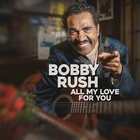
All My Love For You
- Year:
- 2023
- Tracks:
- 10
- Bitrate:
- 320 kbps
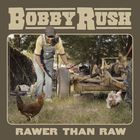
Rawer Than Raw
- Year:
- 2020
- Tracks:
- 11
- Bitrate:
- 320 kbps
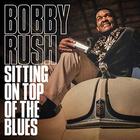
Sitting On Top Of The Blues
- Year:
- 2019
- Tracks:
- 11
- Bitrate:
- 320 kbps
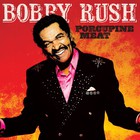
Porcupine Meat
- Year:
- 2016
- Tracks:
- 12
- Bitrate:
- 320 kbps
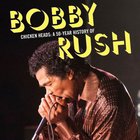
Chicken Heads: A 50-Year History Of Bobby Rush CD4
- Year:
- 2015
- Tracks:
- 18
- Bitrate:
- 320 kbps
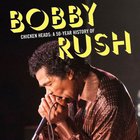
Chicken Heads: A 50-Year History Of Bobby Rush CD3
- Year:
- 2015
- Tracks:
- 16
- Bitrate:
- 320 kbps
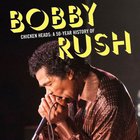
Chicken Heads: A 50-Year History Of Bobby Rush CD2
- Year:
- 2015
- Tracks:
- 19
- Bitrate:
- 320 kbps
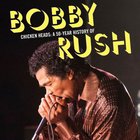
Chicken Heads: A 50-Year History Of Bobby Rush CD1
- Year:
- 2015
- Tracks:
- 21
- Bitrate:
- 320 kbps
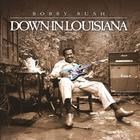
Down In Louisiana
- Year:
- 2013
- Tracks:
- 11
- Bitrate:
- 320 kbps
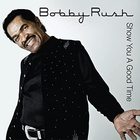
Show You A Good Time
- Year:
- 2011
- Tracks:
- 10
- Bitrate:
- 320 kbps
 Little Milton 29
Little Milton 29 Marvin Sease 20
Marvin Sease 20 Z.Z. Hill 12
Z.Z. Hill 12 Ike Turner 4
Ike Turner 4 Johnnie Taylor 31
Johnnie Taylor 31 Johnny Copeland 18
Johnny Copeland 18 Arthur Adams 8
Arthur Adams 8 ben prestage 4
ben prestage 4 Bill Coday 4
Bill Coday 4 Carl Sims 2
Carl Sims 2 James Carr 7
James Carr 7 Ms. Jody 3
Ms. Jody 3 O.V. Wright 15
O.V. Wright 15 Son Seals 9
Son Seals 9 Arthur Alexander 9
Arthur Alexander 9 Don Covay 6
Don Covay 6 Otis Clay 12
Otis Clay 12 Annika Chambers 4
Annika Chambers 4 Kenny Neal 19
Kenny Neal 19 Lowell Fulson 17
Lowell Fulson 17 Solomon Burke 46
Solomon Burke 46 Swamp Dogg 15
Swamp Dogg 15 T.k. Soul 5
T.k. Soul 5 Theodis Ealey 8
Theodis Ealey 8 Willie Clayton 35
Willie Clayton 35